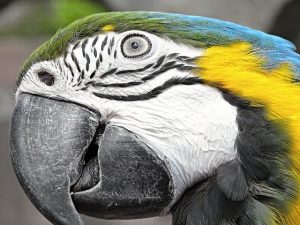 Humans are faced with a long list of everyday things that can lead to an overstimulated state of being. Often, these events result in a wide variety of unwanted feelings and anxieties. We are complex beings and, therefore, fall into complex situations. Our bird companions can become overstimulated, too. And as with people, a collection of unwanted and stressful results can lead to lead to overstimulation in our exotic birds and other pets.
Humans are faced with a long list of everyday things that can lead to an overstimulated state of being. Often, these events result in a wide variety of unwanted feelings and anxieties. We are complex beings and, therefore, fall into complex situations. Our bird companions can become overstimulated, too. And as with people, a collection of unwanted and stressful results can lead to lead to overstimulation in our exotic birds and other pets.
Defining Overstimulation
What is overstimulation? In essence, it is the aftereffect of outside, often unavoidable, contact with sounds, experiences, and unnecessary contact. For human adults, that can be something simple like a loud party with a lot of people, tense moments from work situations, the inability to accomplish something, and many other issues too numerous to list. For babies, it’s over-handling, or an abundance of noise and unfamiliarity. Birds are just as easily impacted by overstimulation. Some handle it well, but others exhibit variable reactions to an environment that is stressful to them.
Overstimulation of birds can be brought on by over-activity in the home. As with children and adults, noise sensitivity can be bothersome to a bird. This might include loud music, children roughhousing near a cage or in the general proximity, or television. Shows with loud, disrupting sounds like gunfire, screaming, etc. that might not bother you could be a source of disquiet for your bird. In fact, if your home is typically quiet, any extreme sound could be upsetting.
Disrupted routines can also be a source of disturbance for a bird. If a bird is cared for by someone else while the usual caregiver vacations or a bird is rehomed for any reason, the change can be terribly upsetting for a bird and lead directly to potentially problematic behavior.
Recognizing Overstimulation
The results of overstimulation in birds can be recognized in many ways. Plucking their feathers, sometimes to concerning levels, hard biting, excessive wing flapping, and screeching for what seems like no reason are all visual and auditory signs that a bird might be feeling stressed. Plucking is an extreme behavior and could be a result of more than just overstimulation. In cases of feather picking/feather plucking, a veterinarian must be consulted to rule out disease, parasites, allergies, infections, and other potential underlying health issues.
Get To The Bottom Of It
Should your bird begin to show results of overstimulation, a checklist can help you to begin to resolve problems. If the stimulation came by way of children being too curious around the bird or too noisy in general, and the bird quiets down after company leaves, then the solution was easily discovered and should be noted. If a bird is in normal conditions and develops overstimulated behavior, then the best thing to do is begin a systematic approach in attempts to arrive at a conclusion. While not all occurrences arrive at fast and sure solutions, it is important that you attend to your bird’s discomfort in a quick manner.
Our exotic bird pets live extraordinarily long lives. They feel life intensely, just like we do.






Beautiful. Thank you.
I greatly will appreciate expert and layperson articles/brief suggestions on how to emotionally and healthfully help my 25 yrs young when I do not survive them. My Macaws are deeply attached to me. They are in my will and funded trust, but money can’t help them transition from a deceased dad to, hopefully, a next final home. I am 68 yrs getting older, in poor health. Macaws will outlive me. How do I help them make the transition? Thank you for your experience, guidance, and prayers for Macaws Rainbow and Judy. Thank you.
If I may: The best way to help your birds when you’re gone is to start now with truly trusted friends or relatives who are willing to take your birds when you die. Have visits, teach your friend/relative about the birds, spend time together so that should you die first your birds will be going straight to a familiar environment and faces.
If there is no one you trust that much, find an excellent rescue. Visit them, ask questions, be nosey, check their financials, and so on.
Either way, be sure it’s in your will who the birds will go to. Tell your neighbors (if you’re friends) who should get the birds in case of an emergency, and it wouldn’t hurt to have a note someplace in plain view should someone have to come into your house that says who to contact about your birds.
You can also chat with your avian vet — they’re familiar with rescues in the area and they’ve probably had to deal with such situations before.
Thank you for thinking of your macaws’ welfare now, before anything happens!